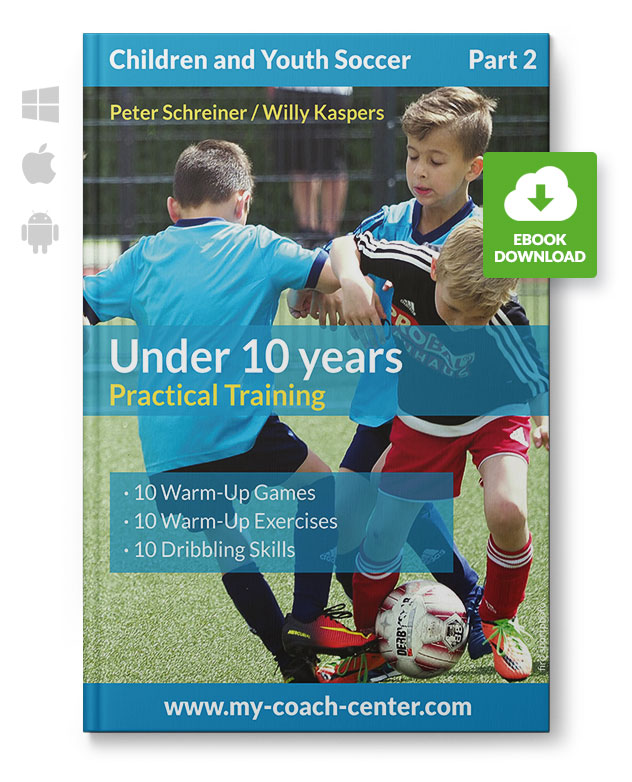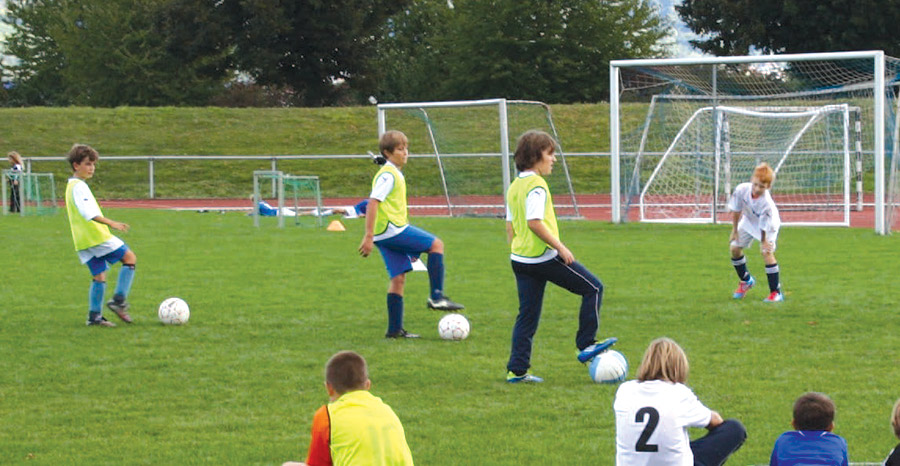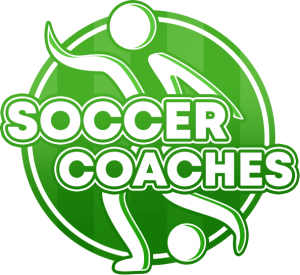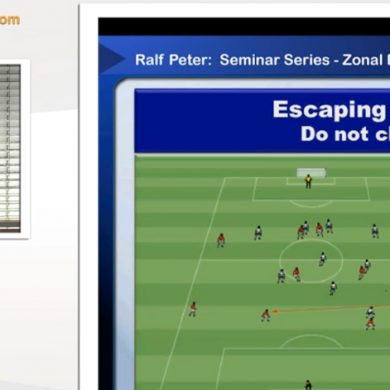9 motivating soccer drills for kids that are movement intensive, create a fun atmosphere and create experiences which appeal to the children’s imagination!
eBook – Child- and Youth Soccer – Practical Training for children under 10 years!

30 fantastic exercises and competitions for children! Easy to implement, practical and age appropriate.
Warming-Up and Mini Games
What are “Mini games”?
“Mini games” are motion games with or without device with a simple set of rules that can be started after a few explanations. They often require only a small amount of space, require little material and usually no special skills of the participants. “Mini“ games have no official rules and therefore offer a lot of room for improvisation and variations regarding:
- the number of players,
- the size of the field,
- the type of the game device,
- the supporting material.
Organization and practical application of mini games
- The playing field and the equipment should be well prepared. In general, with a little improvisation, many available devices can be used.
- The group size should be manageable for the coach.
- Existing field markers (lines) can be used for the pitch layout. It may be necessary to add supportive lines with cones. This simplifies the orientation in space as well as it supports the coach in the formulation of precise location information.
- For team or group divisions with odd number of players, the following options are available:
– The coach joins the group and plays himself.
– A player is used as a so-called joker, he plays always with the ball-possessing team.
– A player is used as referee
Soccer Drills for Warm-Up, Passing and Dribbling
Drill1 – Ring-Ball
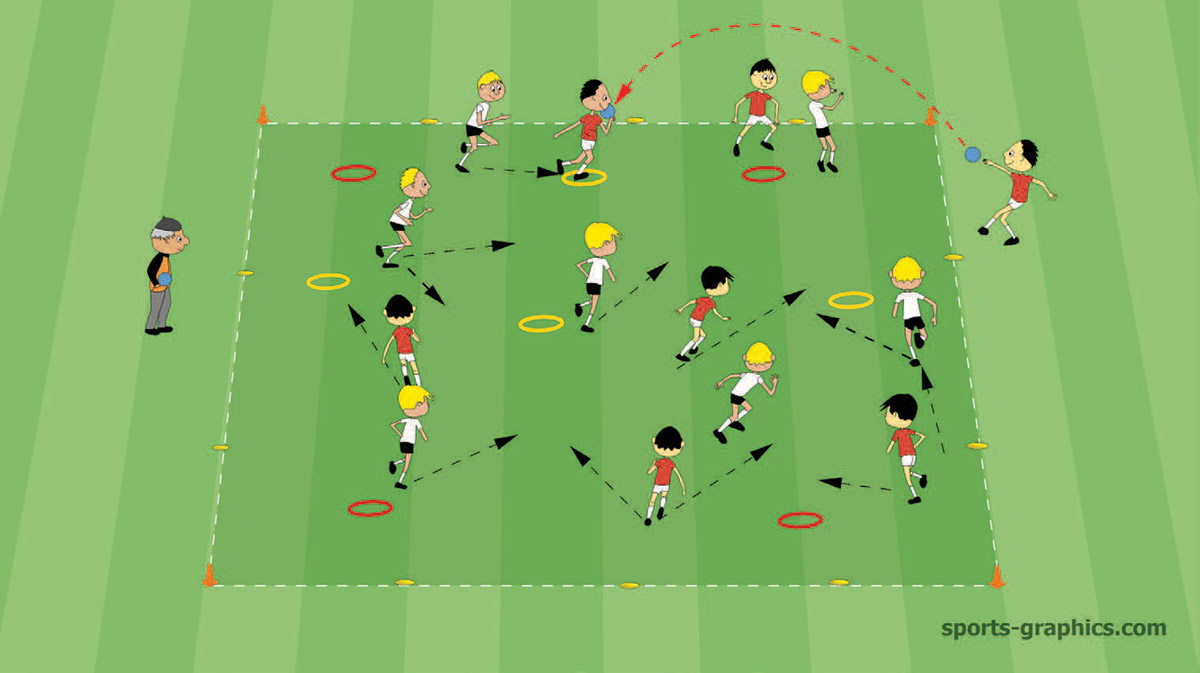
Organization
Playing field: 12m x 12m free in space with cones, 8 rings (always one or two rings more than number of players per team, 7 against 7 or 6 against 6 (depending on the number of players), if necessary duplicate the build up, a softball, series of 3 minutes.
Procedure
- Team A (Red) tries to hold the ball and scores a point by catching the ball
- and at the same time having one foot (left or right) in the ring.
- But if a white team player also has one foot in the ring, the red team will not receive a point.
- Running with the ball is not allowed and holdinh the ball only for a maximum of 3 seconds.
- Team White tries to win the ball, but can not punch the ball out of a players hands.
Coaching Tips
- Movement without a ball
- Good occupation of space
- Good orientation in the room
Drill 2 – Dribble-Game with numbers
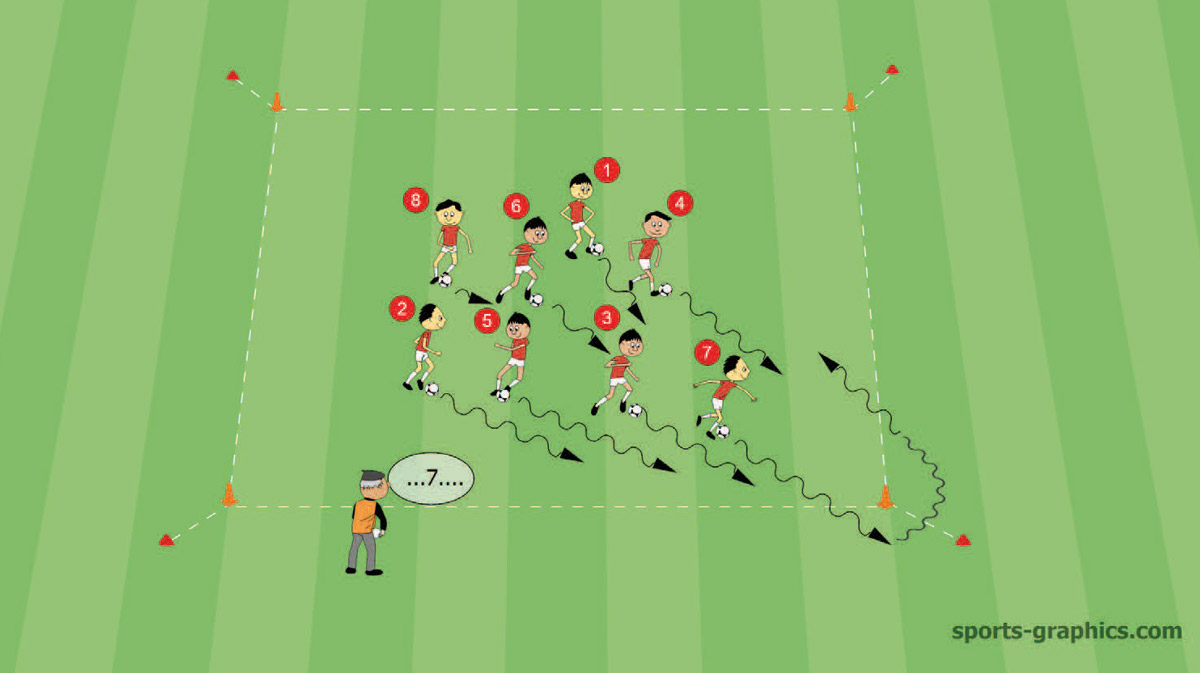
Organization
Depending on the number of players, mark a rectangle freely in space (20m x 20m). Post a further cone 1 meter away behind the outer cap. Each player receives a number, here 1 to 8.
Procedure
- All players dribble freely in space and have a number.
- If the coach calls up the number of a player (here: number 7), the player
- dribbles as fast as possible around a cone he chooses.
- The other players react as quickly as possible and follow him.
- The last player back in the field gets a jersey.
- The first person to have 3 shirts is the loser and everyone else is the winner.
- Two or three series of 5 minutes are possible
Variations
- Players take their ball in the hand and sprint around the cone.
- The called player dribbles around a cone he chooses.
- The others have to dribble around the diagonally opposite cone.
Coaching Tip
Reaction speed and orientation are required.
Drill 3 – Ball-Exchange
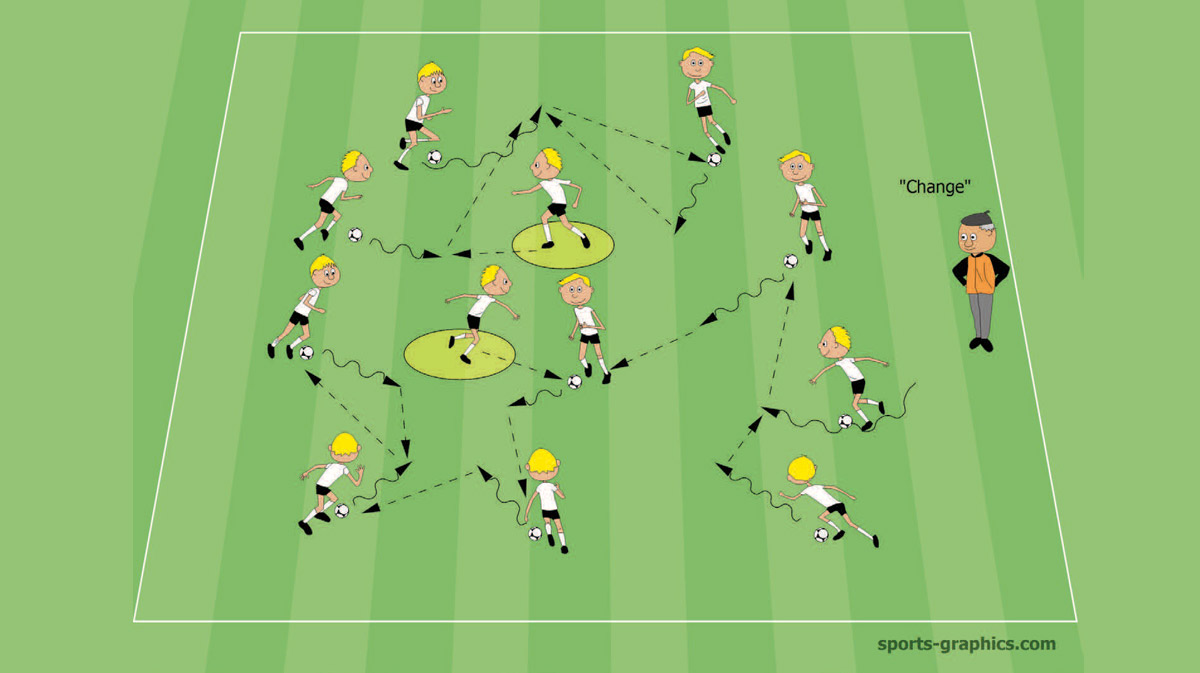
Organization
The players move freely in a limited space of about 20m x 20m. 2-3 players have no ball, the rest dribbles.
Procedure
- The dribbling players leave their ball on a visual or acoustic signal of the coach and look for a new ball.
- Two players come away empty-handed.
Drill 4 – Goal Hunt
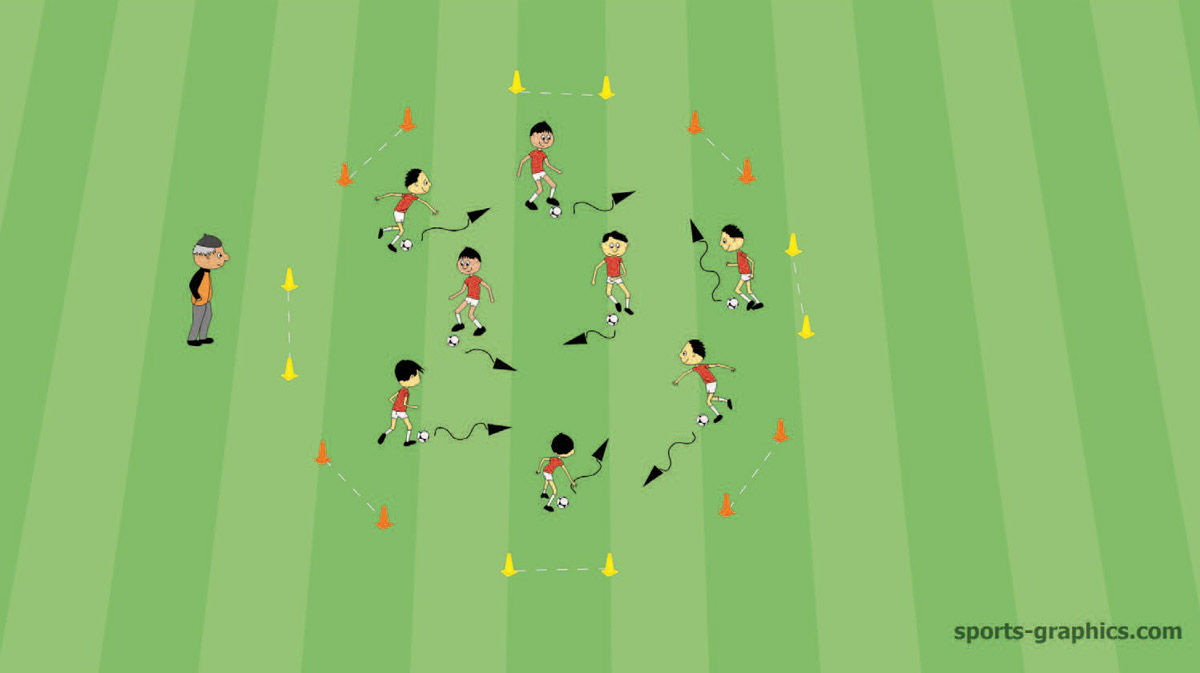
Organization
Build a circle (20 meters in diameter) with goals of cones with 2 colors freely in space.
Procedure
- At the sign of the coach, the children dribble for 30 seconds and try to dribble through as many goals as possible.
- After a red goal, players may only dribble through a yellow goal.
- Which player scores the most goals?
Variations
- Only dribble through the gates with the right or left foot.
- Doing a task after a goal: For example lie on your stomach, jump over the ball three times or sit on the ball for a short time. The imagination of the coach has no limits.
Drill 5 – Island search
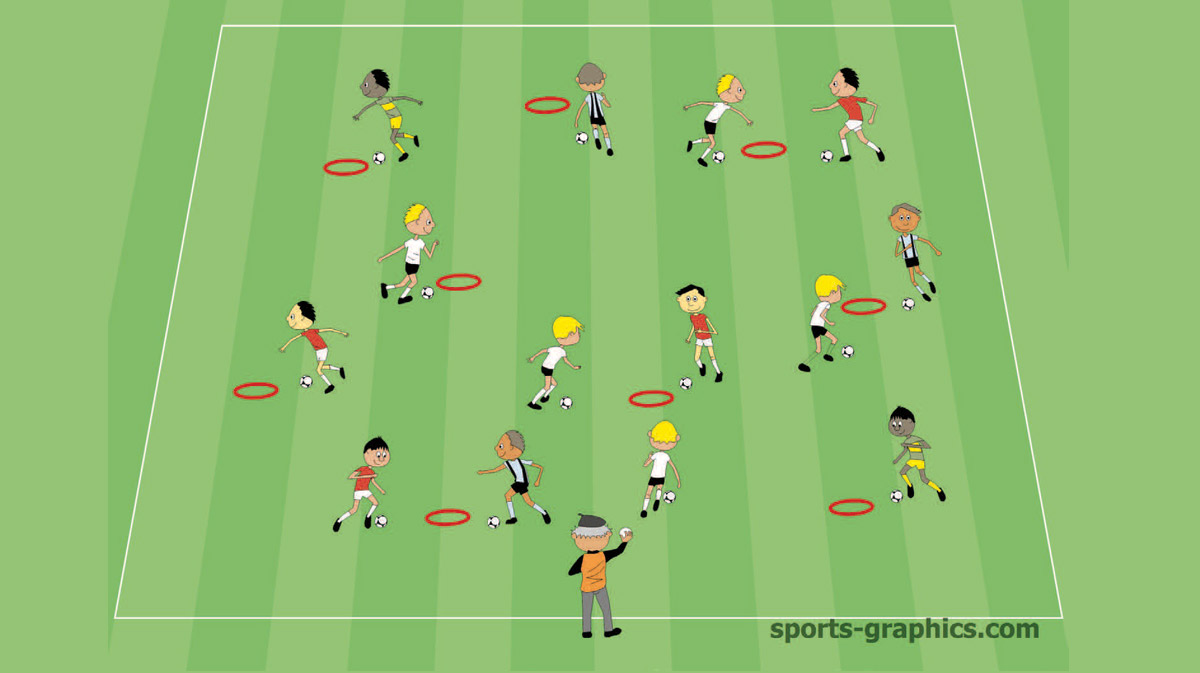
Organization
In a room about 20m x 20m are 2-4 tires less than participating players.
Procedure
- The players dribble freely in space.
- At the sign of the coach (optical or acoustic), the players are looking for an island. Coach‘s sign: Bounce a ball, lift a ball, hide a ball behind back, …
- Because there are not enough hoops left, there are 1-3 players left who can not find an island. They get a minus point (holding jersies in their hand).
- Whoever holds 3 shirts has lost.
Methodical Hint
The coach should walk around the field and give visual signals so that the players
must always look at him while dribbling so as not to miss the starting signal. So
they learn the dribbling with raised head and perception of the environment.
Dribbling and Passing Soccer Drills for Kids
Assuming the players already master the basics of dribbling, this part is about exercises and small competitions, which puts the kids again and again into learning situations in which they can improve and refine their dribbling techniques.
Drill 06 – Dribbling in the pole forest
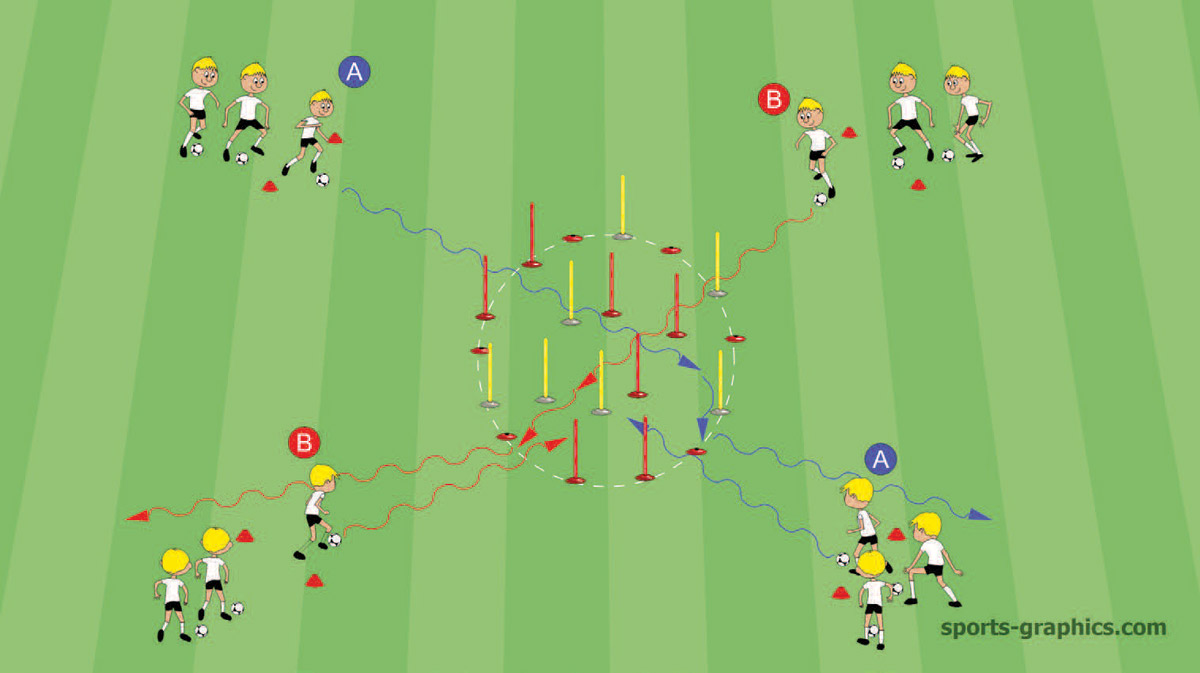
Organization
Setup a 25m x 25m square, build in the middle a circle with poles, diameter of the circle 6m, team A and B position opposite each other.
Procedure
- One player from each team sprints through the poles with a ball in both hands and hands over the ball to the next player (poles must not be touched).
- After the warm-up exercise, the first players of each group have a ball and dribble at the coach’s signal through the pole forest
- On the opposite side, they give the ball to the next player
Variations
- Run and hand over with two balls in both hands
- Dribble with one ball at the feet and two balls in both hands hand-over at the end
- Bars must not be touched. If a ball falls, you must first pick up the ball before continuing or dribbling.
Coaching Tip
The poles are set up in such a way, that players can not walk or dribble straight.
Drill 07 – Dribbling and Passing Drill 1
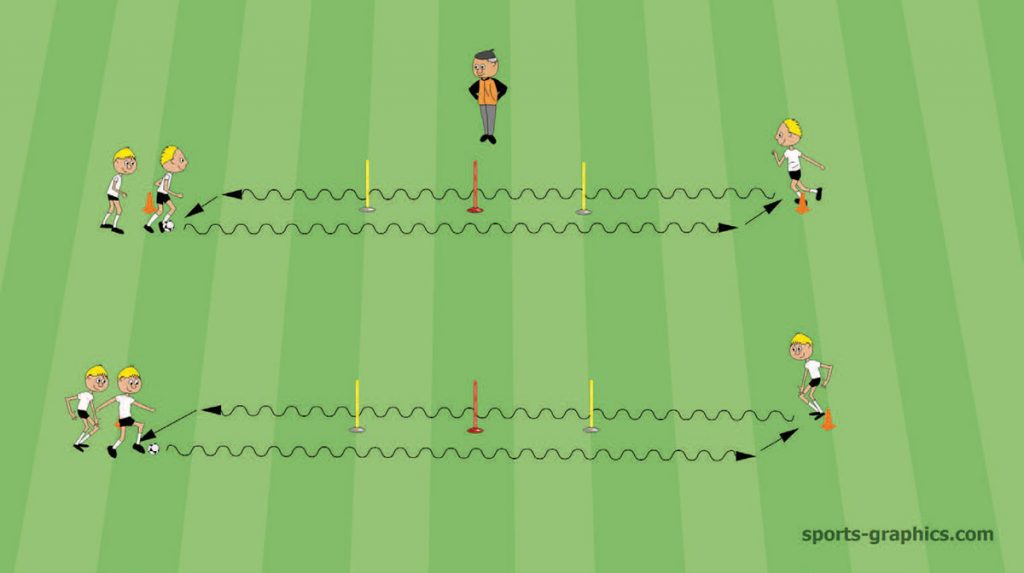
Organization
Form groups of 3 players as shown in the illustration above, each group has a ball, distance of cones 8 to 10 meters, 3 poles in the middle (distance 1m)
Procedure
- The first player with ball dribbles towards the player opposite and hands over the ball and so on.
Drill 08 – Dribbling and Passing Drill 2
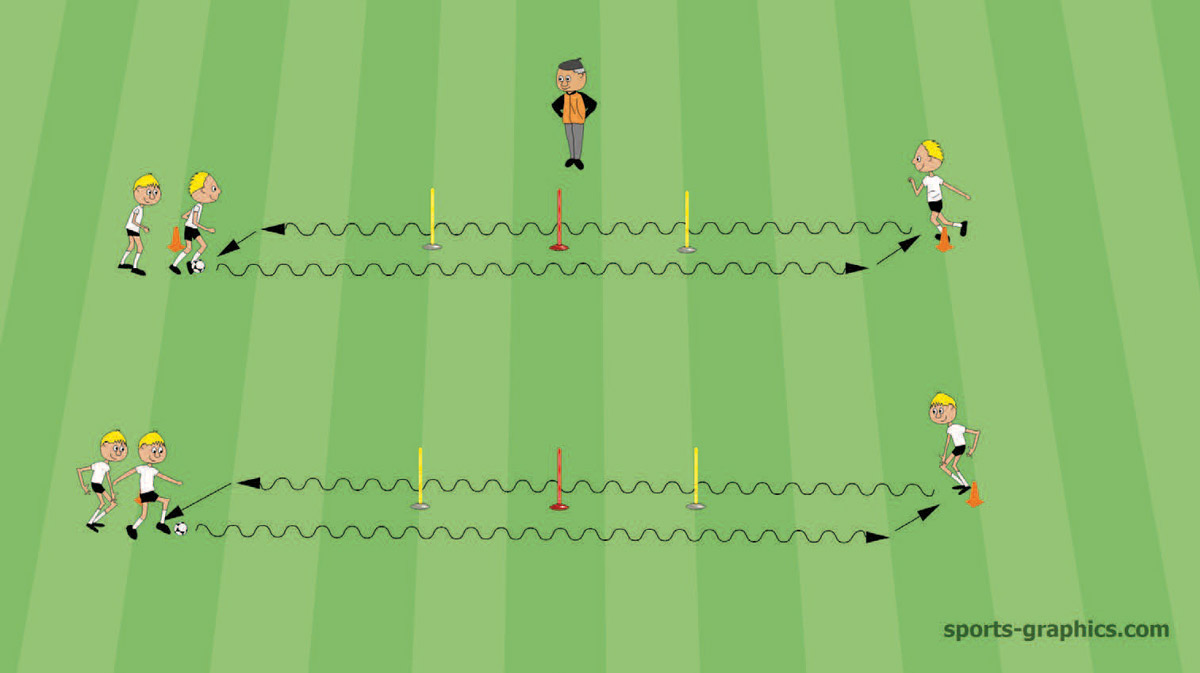
Organization
Form groups of 3 players as shown in the illustration above, each group has a ball, distance of cones 8 to 10 meters, 3 poles in the middle (distance 1m).
Procedure
- The first player dribbles on the right through the first two poles and passes the ball behind the pols with his left foot to the approaching player.
- That player dribbles on the left through the last two poles and passes to the next player.
Drill 09 – Dribbling and Passing Course
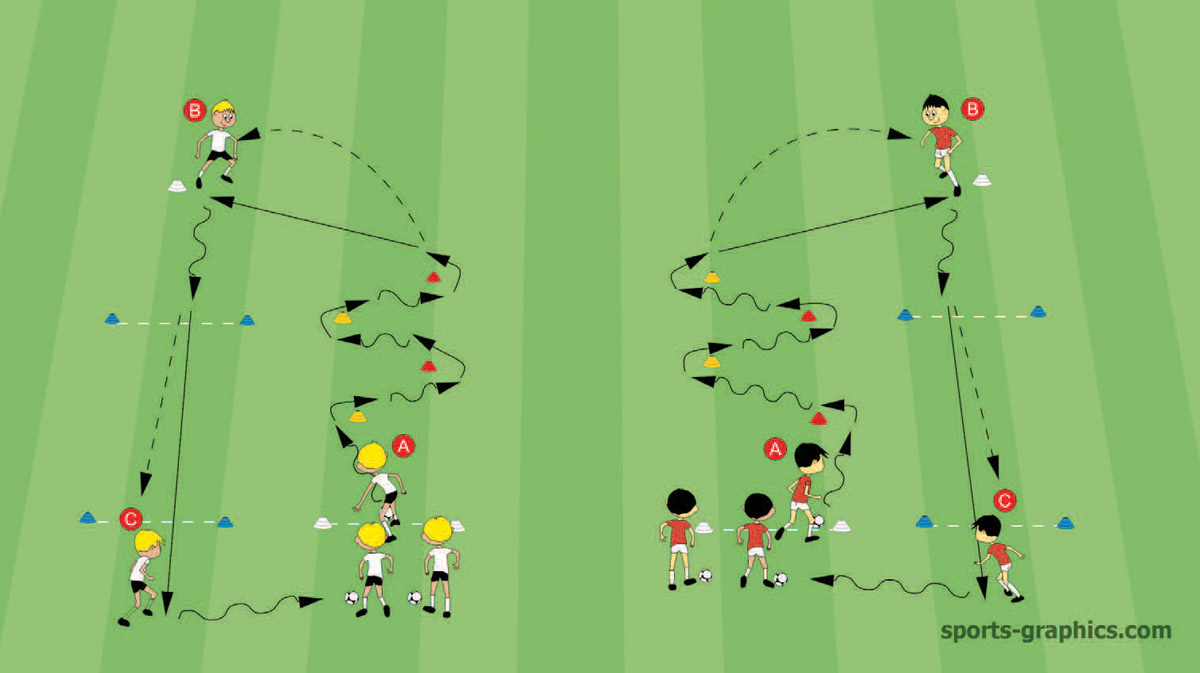
Organization
In the rectangle 25 x 25m, setup the exercise several times – as in the picture – depending on the group size. The dribble area is located once left and once right (two-footedness), no more than 5 players per team.
Procedure
- The first two players (A) dribble with the inside through the zig-zag course and pass on the left side with their right foot and on the right side with their left foot.
- After a short dribble, B passes through the two blue cone-gates to C (distance 6-8 meters).
- C controls the ball and dribbles to the end of the group.
- The team gets one point for each targeted pass through the blue cone-gates.
- Change after 3 minutes.
- Which team has the most points overall?
Coaching Tips
- The yellow cones (inner left) and the red cones (inner left) serve as orientation
- Dribbling and passing are trained in this competition.
Conclusion
We hope you will have as much fun trying these soccer drills with your players as we had creating them! If you would like to know more about practical training for kids and youth-teams, take a look at “Child- and Youth Soccer – Practical Training for U10” with many more drills and games for young players!
eBook – Child- and Youth Soccer – Practical Training for children under 10 years!

30 fantastic exercises and competitions for children! Easy to implement, practical and age appropriate.


